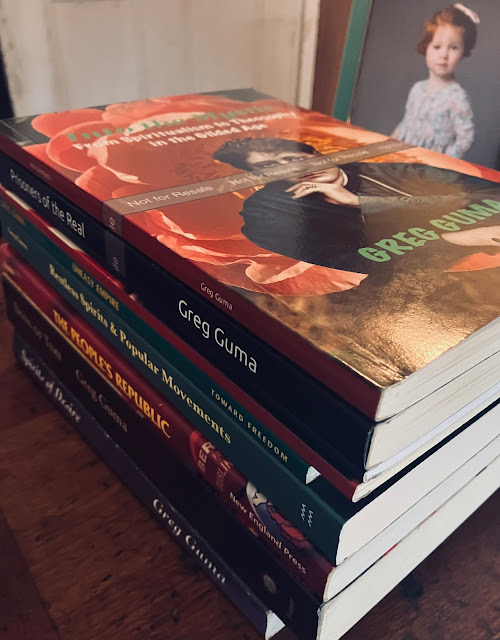Original 1991 words & music radio version
BURLINGTON, VT — Vermont author Greg Guma has released two new books through his publishing imprint, Maverick Books. Though different in style and focus, they explore related topics — the 19th century battle between materialism and spirituality, and the modern struggle between authoritarian power and inspired, inclusive leadership.
Like the remarkable true story that inspired it, Into the Mystic begins in one place and ends in quite another. It starts with grief and ghosts and finds it way to ancient wisdom and universal consciousness, from spiritualism to the birth and growth of the Theosophical movement. Including rare interviews and clippings, it describes the amazing truth about what happened in Vermont in 1874, how critics attacked spiritualism, America’s first official cremation, Helena Blavatsky and Henry Olcott’s first encounter, and their views on materializations, karma, reincarnation, and astral projection.
Order Into the Mystic
Prisoners of the Real is an intellectual odyssey from Pythagoras to planetary consciousness, and also from Apollo to Dionysus. It makes the connection between solar and lunar knowledge and reveals the real costs of preoccupation with certainty and control. Exploring linguistics, psychology, physics, literature, philosophy and management science, it opens the door to a new vision of freedom and cooperation.
Order Prisoners of the Real
Guma has been working on both projects for almost fifty years. Into the Mystic began in 1974 as personal research about the paranormal events in a nearby village a century before. Prisoners… began the same year as a master’s thesis focusing on modern management problems and revolutionary solutions. Both draw on history, philosophy and synchronicity.
From Spiritualism to Theosophy
Video: Prologue
Even before the Civil War began in 1861 about two million people in America had joined the spiritualist movement. It had been growing for more than a decade. When the fighting finally ended in 1865 even more were in mourning and ready to become believers. By 1870 estimates of spiritualists ran as high as eleven million, almost a third of the population, many of them desperate to know what happened after death. In parlors and farmhouses they consulted mediums to find out.
Video: In the Circle
Into the Mystic explores the mysterious events in Chittenden, Vermont, when the Eddy family’s Circle Room seances were famous as a spiritual destination for those who wanted to contact the deceased. Many mediums were charlatans who took advantage of grieving friends and relatives. A few were something more, occultists and mystics, and one stood out from the rest — Helena Blavatsky — a spiritual teacher who would bring the West long-lost wisdom from the East, and a radical new world view.
Video: Afterward
Management vs. Leadership
Security, say the dictionaries, is a feeling of safety or freedom from anxiety. Based on this definition, few people can claim true security in the 21st century. In Prisoners of the Real, Guma presents and explores Dionysian management, an alternative to the dominance of narcissistic leaders, myopic technicians, and calculating bureaucrats. The world already has Dionysian leaders. It could use even more, he explains, inspired people who move beyond blind rationality, expedient answers and authoritarian strategies, and toward liberated groups and institutions that offer opportunity and real choice.
Both print editions will be released in September, with digital editions to follow. Several other books by Guma, published by New England Press, UVM and White River Press, Countryman and Seven Locks, Fomite and Maverick Books, can also be ordered online or at bookstores. Link here to Explore the collection online.
Other Titles
Guma has been publishing books since the 1980s, notably including The People’s Republic (1989), his acclaimed study of Vermont before and during the mayoral era of Bernie Sanders. In 2021, he released Restless Spirits & Popular Movements. A new history of Vermont’s political and social movements, it is filled with little-known stories about key figures. He has also written several novels, including Spirits of Desire (2004), an imaginative retelling of Blavatsky and Olcott’s first adventures that is currently being adapted for film, and Dons of Time (2013), a speculative adventure about time travel, corruption, and the control of history.
In 1992, he co-authored Passport to Freedom: A Guide for World Citizens, with Garry Davis. While working for the international affairs periodical Toward Freedom, he wrote Uneasy Empire (2003), looking at the anti-globalization movement and weaponization of the “war on terror” after 9/11. Fake News (2018) was developed as a lecture on information warfare after the election of Trump. Planet Pacifica (2021) revisits Guma’s time as director of the country’s original listener-sponsored radio network, and why the organization went to war with itself.
Send review copy requests, including full name and USPS address, to: mavmediavt@gmail.com




